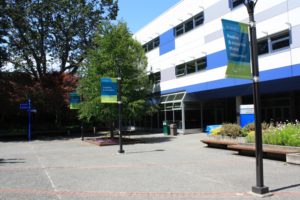On Thursday, June 14, the provincial government announced $1.5 million in funding to be split between 20 British Columbia post-secondary institutions, including Camosun College. Each institution will use their $75,000 to create or expand programs for students with cognitive, mental, or physical disabilities.
Camosun vice president of student experience Joan Yates says the college is looking at using its share of the money to create a combined pilot program teaching basic employment skills with the college’s Centre for Accessible Learning and the Applied Learning Co-op Careers Services department.
“We’re going to look at developing a job search and job readiness skills that we can do a little research on,” says Yates, “and then for folks with certain cognitive disabilities, be able to work with them on options, but we know that they need a little bit of support to get to that point. This is going to help us develop a specific program aimed to help those students in terms of their own job searching.”

Camosun College Student Society (CCSS) wellness and access director Eleanor Vannan says that she’s very happy with any additional funding that makes education accessible.
“I hope this is a sign that this government intends to continue to invest because we do know that there are a large number of jobs that will be opening in the next 10 years and that around 80 percent of those jobs will require some post-secondary,” says Vannan. “We need to make sure that we’re setting up young people now to have the skills to go into the workforce, and I think ensuring that there’s access for people of all different abilities and different backgrounds is a really, really important thing to be investing in.”
Yates says the $75,000 won’t cover the entire cost of the program, which will teach students how to look for a job, what skills need to be developed to work with employers, and how to dress for work.
“Some basic elements around job readiness is what we’re going for,” says Yates.
Yates wants to give students the knowledge and confidence so that they can go out, with support, and find work.
“How you work with your supervisor, how you get paid, all those kind of job-seeking 101s that, if you’ve had a couple of jobs, you will have learnt them,” she says.
Yates says that various Camosun College departments will be working together on the program for now.
“We’ll be working with a couple of programs and just a small number of students to begin with. We will be working very carefully with those students to assess how the program works and what we could do better,” says Yates.
Yates says that she would love for the program to expand if it works out, but for now the college will make sure career servicing and coaching is aligned with existing Camosun programs.
“I’d like to see a program that applied to students across the college that isn’t necessarily discipline specific, but provides some good, high-level ‘This is what you need to know to get a job,’” says Yates.
Camosun second-year Practical Nursing student Jeremy Hudson says a job skills training program seems like a good use of the grant money.
“I don’t know much about how exactly the money’s being spent,” he says, “but it seems like an effective use of resources.”
Rachel Chan, who is also a second-year Practical Nursing student, thinks it’s great that Camosun is giving opportunities to people who might not normally get them, although she has some concerns.
“I do feel like [people with] a mental disability kind of need a separate course to do things than people with a physical disability,” she says. “Especially people with a learning disability; they might need extra resources; they might need extra instructions about how to do stuff like writing a resume than people who have physical disabilities that don’t really need the extra layer of the instructions that people with a learning disability might.”
Vannan says it would make sense to build on existing programs “and get a larger reach and benefit more people.”
“At the end of the day, if you’re creating more programs and you’re increasing the accessibility of the college, there isn’t really a way to go wrong with that,” she says.
The program is still in its early planning stages and will be implemented sometime this year.

